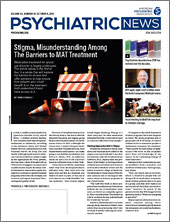A 40-year-old pharmacist, whom you have been treating for five years for generalized anxiety disorder, has done well on escitalopram augmented with regular exercise and a men’s support group. After a motor vehicle accident in which he sustains a moderate concussion, he complains of headaches, cognitive fogginess, and diminished concentration while multitasking. Neuropsychological testing shows mild impairment of executive function, particularly with response inhibition and sustained attention during complex tasks.
He tells you that managing the details of a busy pharmacy for a full workweek is difficult and asks you to fill out a form stating that he can work only 30 hours a week. The form requires information about your patient’s diagnosis, extent of impairment, and prognosis, as well as which work duties are affected. You want to help your patient, but you are uncomfortable completing the form because you’re not sure you know the answers to all of the questions.
The role of a clinician is to evaluate and treat the patient. In this capacity, the clinician has a fiduciary duty only to the patient, which means that the patient’s needs are paramount. The word “fiduciary” derives from the Latin root fiducia, which means trust. Commonly used in the context of banking or other financial services, in which the financial agent places the client’s interests above the company’s own, it also applies to health care professionals. Patients trust that their physicians are making treatment decisions based on what is best for the patient, not what is most profitable or interesting to the physician. They also are assured of patient confidentiality.
The role of an evaluator is distinct from that of a clinician. An evaluator’s task is to complete an assessment and provide a report on the findings, usually to a third party, such as an employer, insurance company, Social Security Administration (SSA), attorney, or court. The evaluator’s fiduciary duty is divided between the patient and the third party.
The patient should be able to trust that the evaluation will be objective and complete, that the report will be delivered in a timely manner, and that the limits of confidentiality inherent in reporting to a third party will be respected. That is, the physician may share relevant information with the third party to complete the assessment report but will respect the patient’s confidentiality in other domains.
The evaluator also owes a fiduciary duty to the third party. The employer, insurance company, SSA, attorney, or court rely on the assessment to be objective and unbiased. If the evaluator does not find the patient to have the extent of injury or disability that the patient would like to have represented, the evaluator is obligated by his or her duty to the third party and to society to be honest in the report, even though the patient may perceive this as unhelpful.
If a psychiatrist is both the patient’s clinician and evaluator, there is potential for role confusion and harm to the psychiatrist-patient relationship. If the patient wants a certain outcome from the evaluation, the psychiatrist may feel subtle or overt pressure to please the patient and preserve the alliance. However, if the psychiatrist skews the report in favor of the patient, that could be considered fraud and an abrogation of the psychiatrist’s duty as an evaluator for the third party. That said, if the psychiatrist reports objectively in the evaluation and the patient does not get the desired outcome, the patient may feel betrayed, harming the treatment alliance.
Some invitations to serve in a dual role are clear and easy to decline. For example, if a patient is involved in a civil or criminal legal proceeding, the treating psychiatrist should not serve as an expert witness in the case. The complete loss of confidentiality inherent in testifying in a deposition or courtroom is destructive to the treatment relationship, and patients usually are able to understand and appreciate the psychiatrist’s desire to protect the patient’s confidentiality in this context.
Trickier are the requests to complete applications for disability, disability bus passes or parking permits, emotional support animals, and test accommodations. Some of these may be appropriate, but others may put the psychiatrist in the uncomfortable position of bending the truth to benefit the patient. There are no black-and-white rules on which to rely; rather, the psychiatrist must consider each request on a case-by-case basis.
Returning to the case of the pharmacist with mild neurocognitive impairment, should the psychiatrist fill out the work accommodation form? It depends.
On the one hand, if the psychiatrist has significant experience in neuropsychiatry and feels confident in his or her ability to assess impairment and predict prognosis, it may be appropriate to complete the form. On the other hand, how does the psychiatrist know what work duties are affected other than through the patient’s own report? What if the psychiatrist completes the form the first time, but then the form must be modified to support a change in the work position desired by the patient? Precedent has already been set with the patient that these forms are part of the service provided by the psychiatrist. At some point, even if initially comfortable with completing an evaluation, the psychiatrist may need to set a limit on what evaluative services he or she is willing to conduct. Explaining to the patient the tension between clinical and evaluative roles may help preserve the alliance when declining to complete any additional evaluations. ■

